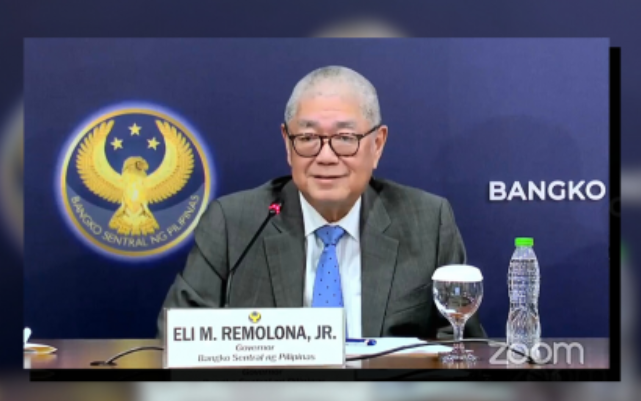If you think high oil prices and increasing bank interest rates only concern motorists and business owners, think again!
In a press release posted on its website, the Philippines’ leading central banker has recently issued a warning about the risks facing the nation’s financial system due to energy-related products and the ongoing high-interest rate environment.

BSP Governor Eli Remolona, Jr. during the latest Financial Stability Coordination Council meeting
During the latest Financial Stability Coordination Council (FSCC) meeting, Bangko Sentral ng Pilipinas (BSP) Governor Eli M. Remolona, Jr. highlighted the challenges posed by these factors.
“Volatility in the price and supply of energy-related products can affect economic activity, while a prolonged period of high global interest rates will weigh on debt servicing in general,” Remolona stated. “We find comfort in the broad indications of stability and their effects on the economy. These are issues that the FSCC will continue to monitor.”
His remarks also underscore the delicate balance the Philippines must maintain amid fluctuating global conditions.
Significant risks remain
As FSCC chairman, Remolona acknowledged that while there are broad indicators of stability positively impacting the economy, significant risks remain. The council’s latest executive committee meeting noted that although global market volatility indicators have stayed low, there is notable instability in global oil prices, illustrating the complex and unpredictable nature of current economic conditions.
The FSCC also expressed concerns about persistent high inflation in the United States. Despite a decrease, inflation rates remain elevated according to the Federal Reserve’s assessments, suggesting a prolonged high-interest rate environment that could have far-reaching implications for the global economy, including the Philippines.
Geo-political risks were another topic of scrutiny during the FSCC meeting. Described as “protracted,” these risks could have long-lasting effects on the economic landscape. Despite these concerns, the council expressed confidence in the resilience of the Philippines’ economic growth, noting it remains “amongst the highest in the world.”
This robust growth offers a counterbalance to the identified risks, providing some reassurance amid uncertainties.
Governor Remolona emphasized the BSP’s commitment to strengthening the country’s financial system. Recently, the central bank signalled its intention to further develop the Philippine capital markets. This initiative aims to enhance the resilience of the financial system, ensuring it can better withstand external shocks and maintain stability.
The BSP’s focus on capital market development is part of a broader strategy to secure long-term economic stability and growth. By fostering a more robust financial infrastructure, the central bank aims to mitigate risks associated with external economic pressures and geopolitical uncertainties.
As the Philippines navigates these challenges, the central bank’s vigilance and proactive measures will be crucial. Governor Remolona’s warnings serve as a reminder of the delicate balance required to ensure continued economic stability and growth.
The FSCC’s ongoing monitoring and strategic initiatives reflect a concerted effort to safeguard the country’s financial system in an increasingly volatile global environment.







